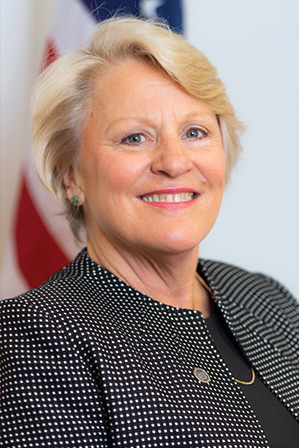Telling Our Story to the American People
President's Views
BY BARBARA STEPHENSON

I recently spent two weeks on the road, explaining to fellow Americans what we in the Foreign Service do and why it matters to them. As AFSA president, I have been determined to increase awareness of and appreciation for the vital work of the U.S. Foreign Service. We have made real progress on this front, with your help. I hope each of you will join us in the effort.
In every talk, I explain how the Foreign Service works to keep threats at bay so our fellow Americans are safe at home, and I give examples that illustrate the many ways we help level the playing field for American businesses. That not only helps keep our country prosperous, it also reminds host nations, through the positive example American businesses so often provide, what they love about America—our cutting-edge innovation and design, our transparent and accountable business processes, our fair hiring and promotion practices, our unparalleled excellence at managing complex projects and solving complex problems.
I make clear that our economic and commercial diplomacy is about more than successful transactions that keep us prosperous—as important as that is (please see FCS VP Dan Crocker’s excellent column on commercial diplomacy in AFSA News). The work we do to keep American companies competitive, to keep them viable and visible in overseas markets, also materially contributes to America’s soft power, to our standing in the world and to America’s global leadership.
In every talk, I remind fellow Americans that, if they are concerned that America’s global leadership is being challenged as China gains commercial, economic and political ground (and Congress, which has held a dozen hearings on this topic, certainly is), they should not overlook one key, cost-effective, “shovel-ready” component of the solution set: the U.S. Foreign Service. We’re eager to get back on the field and cover all the bases.
I remind audiences that China’s spending on diplomacy has increased by 40 percent over the past five years while America’s spending on core diplomatic capability has fallen by a third. I let them know that, while I am grateful to Congress for recognizing that America’s global leadership could not afford the deep cuts proposed to the international affairs budget, we could really use some additional funding to rebuild America’s core diplomatic capability so that our country can compete effectively in the current environment.
One hundred million dollars would go a long way: it would cover the overseas support costs for shifting 300 mid-level FSO positions from Washington to embassies and consulates overseas, where the Foreign Service works its real magic for the American people. It would give us a shot at delivering some real wins for the American people—and a shot at proving your worth in a highstakes, highly competitive promotion process.
Additional overseas positions, especially for economic officers, would help address serious commercial competition in the short term while also, over the longer term, developing the leadership bench the American Foreign Service will need over the coming decades.
How can you help? First, tell your stories. Sincere thanks to each and every one of you who contributed to the “Economic Diplomacy Works” collection for the upcoming January-February double edition of The Foreign Service Journal.
These rich stories will reach members of Congress (who all receive the FSJ) and the American public (through AFSA’s outreach), as well as serving as an inspiration to fellow members of the Foreign Service who see how you made economic diplomacy work at your post and try it at theirs.
Active-duty members who host members of Congress have an enviable opportunity to highlight the excellent work being done at their post, so I urge all of you hosting a CODEL to plan ahead and polish your story. Effective storytelling takes time and effort, but it’s a skill worth mastering. And, if you are retired, please join the Speakers Bureau and take advantage of the rich library of material AFSA is developing on what the Foreign Service does and why it matters.

